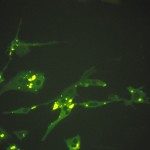Lien vers Pubmed [PMID] – 21987737
J. Infect. Dis. 2011 Nov;204 Suppl 3:S1011-20
In sharp contrast to human and nonhuman primates, guinea pigs and some other mammals resist Ebola virus (EBOV) replication and do not develop illness upon virus inoculation. However, serial passaging of EBOV in guinea pigs results in a selection of variants with high pathogenicity. In this report, using a reverse genetics approach, we demonstrate that this dramatic increase in EBOV pathogenicity is associated with amino acid substitutions in the structural protein VP24. We show that although replication of recombinant EBOV carrying wild-type VP24 is impaired in primary peritoneal guinea pig macrophages and in the liver of infected animals, the substitutions in VP24 allow EBOV to replicate in guinea pig macrophages and spread in the liver of infected animals. Furthermore, we demonstrate that both VP24/wild type and the guinea pig-adapted VP24/8mc are similar in their ability to block expression of interferon-induced host genes, suggesting that the increase in EBOV virulence for guinea pigs is not associated with VP24 interferon antagonist function. This study sheds light on the mechanism of resistance to EBOV infection and highlights the critical role of VP24 in EBOV pathogenesis.

